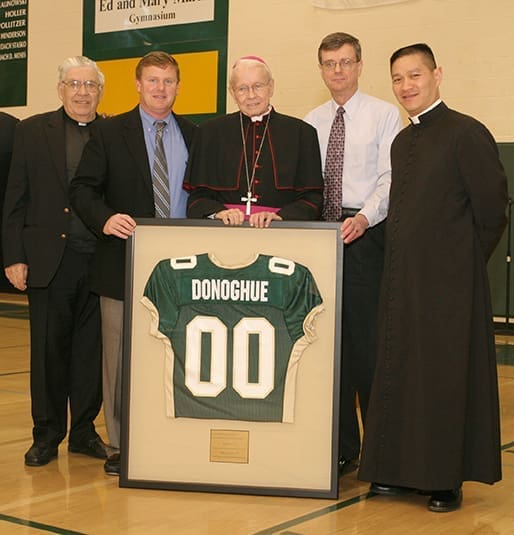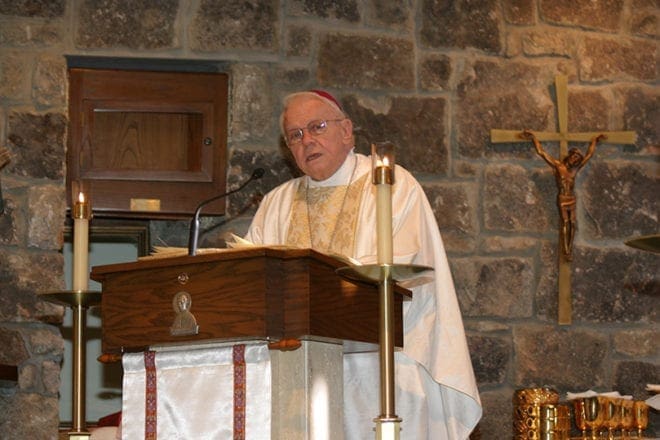 Photo By Michael Alexander
Photo By Michael AlexanderAtlanta
Archbishop Saw Catholic Schools As Key To Future
By ANDREW NELSON, Staff Writer | Published November 24, 2011
A crowning achievement in the Atlanta Archdiocese by retired Archbishop John F. Donoghue started as a 100-acre cow pasture.
The land in Roswell where Blessed Trinity High School, Queen of Angels School, St. Peter Chanel Church and St. George Village retirement community sit was farmland when it was purchased.
Father Frank McNamee was the administrator of the new St. Peter Chanel mission in Roswell, which was to be built on the pasture.
“They told me where the property was. I remember going out there one day and climbing over the gate and thinking, ‘We’re going to build what?’”
“To see the whole thing unfold was just amazing. It was Archbishop Donoghue’s commitment to education. He was going to make this happen.”
The Catholic campus in Roswell that started as a cow pasture was constructed for roughly $96 million, according to figures from Catholic Construction Services, Inc.
When other Catholic dioceses faced decisions about closing schools and parishes, the Atlanta Archdiocese moved in the opposite direction. A strong supporter of Catholic education, the late archbishop built two archdiocesan high schools and three elementary schools during his tenure. In addition to the two in Roswell, they are Our Lady of Mercy High School, Fayetteville; Holy Redeemer School, Johns Creek; and Our Lady of Victory School, Tyrone.
He also promoted the movement to open independent Catholic schools and invited the teaching order of the Dominican sisters of St. Cecilia, based in Nashville, Tenn., to come to the archdiocese.
At the same time, he closed two parish schools in urban Atlanta and merged them with a third parish school into one regional Catholic school in Decatur.

Earlier this year Archbishop John F. Donoghue, center, was joined by (l-r) Deacon Ray Egan, Blessed Trinity High School athletic director Ricky Turner, Blessed Trinity principal Frank Moore and Blessed Trinity religion teacher Father Augustine Hoa T. Tran as he was presented with a special commemorative jersey in gratitude to his vision and support of the founding of the Roswell Catholic high school. Photo By Michael Alexander
School communities honored the man for his efforts. Holy Spirit Prep School, where the retired archbishop served as rector, named its Upper School after him. Blessed Trinity High School named its performing arts center in his honor.
George Aulbach, who served on the archdiocesan Finance Council and various other archdiocesan boards for more than 20 years, recalled fond memories of working with the archbishop.
During the school building growth spurts, the archbishop and Aulbach talked frequently, planning for how things would unfold.
“He painted a vision; he wasn’t very specific. We worked through it. I would meet with him once a week with the schools,” he said.
“The main thing he wanted was if it was going to be financially sound and we could make it work,” he said. “He left it up to us to put it together for him. I enjoyed working for him.”
Msgr. Edward J. Dillon, pastor of Holy Spirit Church, Atlanta, served as vicar general for Archbishop Donoghue until 1997. He said the archbishop “was highly, highly interested in Catholic schools” and when the Archdiocese of Atlanta was opening new schools in 1999 and 2000, it was probably the only diocese in the country doing so.
It is “a testament” to the real need for the schools, he said, that four of the five schools are at capacity.
The archbishop also was always willing to come to school events, Msgr. Dillon said, support that’s “very critical” to Catholic schools.
Karen Vogtner, principal of St. John the Evangelist School, Hapeville, called Archbishop Donoghue a “visionary.”
“He did so much to bring about that focus on the Eucharist. It all began with his vision,” she said. “Not only with the Eucharistic Congress but also with Catholic education.”
There was also a vision on the financial side. He had this idea “that all parishes support” Catholic education. He really implemented that, which allows Atlanta to be a “real model for Catholic education in terms of accessibility and affordability,” she said.
When you see schools closing across the country, here in Atlanta the Catholic schools are “strong and vibrant. He was a good friend to Catholic education.”
She said, “When you always put Eucharist first, God pours the blessings, pours them out.”
Blessed Trinity High School Principal Frank Moore was appointed to the position by Archbishop Donoghue. And he made it a point to introduce the archbishop to students during visits as “the guy who started your school.”
The archbishop always visited the campus yearly. He came more frequently after he retired, when he would hear confessions of students and staff.
The final job interview for the new high school was more like catching up with a former colleague, Moore said. Moore returned to the archdiocese from a short stint out of state after years working at St. Pius X High School.
Archbishop Donoghue “knew that he was following the will of his flock” in devoting resources to Catholic education, said Moore.
The archbishop saw Catholic schools as key for the church and the whole community.
“It’s the future of the church. We need children educated in the faith and educated in a way that makes them good citizens of their community, of their world, as well as the church,” Moore recalled the archbishop saying.
Steve Spellman, the St. Pius X High School principal, got to know the archbishop not only through his work, but also served with the archbishop to organize the annual Eucharistic Congress.

Archbishop John F. Donoghue is the main celebrant and homilist during the Jan. 28, 2004 Catholic Schools Week Mass at St. John Neumann Church, Lilburn. Photo By Michael Alexander
Since its 2001 start, the event attracts a crowd of more than an estimated 20,000.
“His heart was just in that. It’s always been his signature event. This was going to be an event to bring everybody together. It would continue to grow.”
“He was a strong leader. He led the archdiocese during dynamic growth. I am going to remember him very fondly,” said Spellman.
Taking over the principal position after a leadership role at Gwinnett County schools, Spellman had never met the archbishop except in passing at church functions.
The school chaplain at the time, Legionary of Christ Father Scott Reilly thought the oversight needed to be fixed. He organized lunch with the three of them, Spellman, Father Reilly and the archbishop. Soon, the three sat down at Bones, an upscale restaurant on Piedmont Road. Afterwards, the check was delivered.
“I noticed neither one of them was reaching for the check,” he recalled as he laughed. “I grabbed it. Later, (Father Reilly) joked, ‘Welcome to the Catholic Church.’”
The time spent with the archbishop and its focus on Catholic education made an impression on Spellman. “I remember how gracious he was to me. It was a delightful experience for me.”
Judy Guilfoil, a parishioner at Good Shepherd Church in Cumming, worked closely with the archbishop during the early years of establishing Pinecrest Academy, an independent Catholic school, and attributes his leadership to the success of the budding school.
“He had an amazing gift to help establish Catholic education,” Guilfoil said, adding that his love for Catholic schools had an impact on the founding of Pinecrest. “His love of the Eucharist encouraged all of those at the school to surround the school with the Eucharist.”
“He strengthened us personally,” she added. “He was a father to us and a very dear friend. He loved us.”
June Isaf, who served as the development director for Pinecrest Academy during its early years, remembered Archbishop Donoghue’s encouragement as the school opened its doors.
“His authentic generosity and his humility were so easy to work with,” Isaf said. “He was so approachable as an archbishop.”